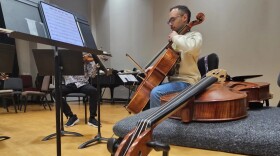-
Your brain may be aging faster than your body, according to University of Florida researchers who study how lifestyle factors affect brain age.
-
The university's School of Performing Arts and College of Medicine are working together on an experiment to better understand how music affects dementia patients.
-
Research says our brains pick and choose which memories are important using a sliding scale to decide what to preserve,
-
The kits are designed to jog memories and initiate conversation between patients and their caregivers.
-
Lakshmi Kunta was diagnosed about three years ago, and now at age 77, she is completely reliant on her husband and children to care for her.
-
On "What's Health," host Dr. Joe Sirven explores the invisible dangers of stroke. Then, the program hears compelling stories from the frontiers of neuroscience.
-
USF associate professor Joseph Dituri, a Navy veteran who survived a TBI, hopes the pressure of pure oxygen into the body will decrease neural inflamation.
-
There’s no guarantee the devices will be maintained after the clinical trials finish and no mechanism requiring companies to do so. A researcher aims to change that, but grants left the project in limbo.
-
A new study from researchers in Montreal dives into how caffeine transforms our brains during sleep — and why younger people might feel the impact more.
-
Elon Musk didn’t provide any details about the latest patient to get an implant from his brain-computer interface company, but there are updates on the previous ones.
-
There’s increasing evidence that tackling 14 risk factors would delay or prevent nearly half of dementia cases.
-
The first new guidelines in 10 years from the American Stroke Association for people and doctors reflect a better understanding of who gets strokes and why, along with new drugs that can help reduce risk.
Play Live Radio
Next Up:
0:00
0:00
Available On Air Stations











